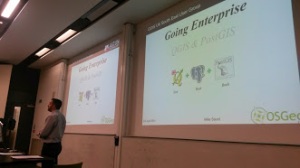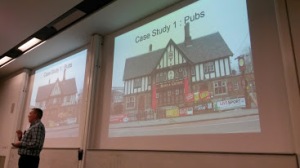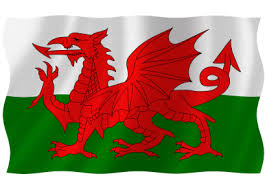Since helping to organise the inaugural meeting in September 2013, this was the first UK QGIS South-East UG meeting which piggy-backs off the success of the Scottish and Welsh UG meetings.
Putting an agenda together isn’t the easiest thing to do at the best of times and especially given that the use of QGIS here in the UK is still in its infancy but thankfully without much need for pleading many kind people came together to help out and make the day a great success.
Imperial College hosted the event for us and everyone one agreed that the facilities were fantastic. A special thanks needs to go to Claudia Vitolo for arranging everything for us at Imperial. There was a good turnout with about 55 people turning up, with a real mix of public, private and academic backgrounds.

David McDermott started off proceedings with a talk about Atlas and Map Production. He cleanly illustrated to the audience through screenshots how Surrey Heath Borough Council are using this fantastic feature of 2.2 to produce lots of maps, quickly, efficiently and importantly eye-pleasing.

Mike Saunt demonstrated through a mixture of presentation and live demo a series of tweaks within QGIS and using a bit of SQL in PostGIS, how QGIS can be an Enterprise GIS tool. For those in the audience that new to QGIS or looking for alternative GIS solutions were keen to ask questions about the QGIS/PostGIS architecture which Mike was very happy to answer, sighting many case examples.

Jerry Clough gave a well received talk on OpenStreetMap and promoted a lot of conversation. Jerrys’ talk was a real mixed bag of factoids and tips on OSM in general and using it within QGIS.
Andrew Bell gave the audience a treat by demonstrating how with some simple PostGIS SQL you could within QGIS draw a line or route (from A to B) which would automatically buffer and select features from the Ordnance Survey PoI (Points of Interest) layer that fell within the buffer. All very simple but very effective process. Andrew admitted that this had a lot of scope and could be adapted for Emergency Planning for example.
View presentation here
The afternoon sessions saw two workshops;
Pete Wells from Lutra gave a whistle stop run through of using Python and QGIS, and went as far as producing a very simple plugin all within the space of an hour and ten minutes. It was a well attended talk and the sort of workshop that future user groups should try to repeat.
The Ordnance Survey did an Introduction to QGIS using OS Opendata and was equally well attended as Pete Wells workshop, as both workshops ran at the same time. The talk was loosely based on the successful OS MasterClasses that have been run over the past few years.
The schedule of the day quickly slipped, mainly due to the great audience participation at the end of the presentations. As a result the afternoon workshops, ‘its your floor’ and discussion sessions were shortened so that a 4pm finish was achievable.
Its your floor was a bit of a wild card slot in the days agenda. Prior to the event the attendees were asked if they wanted to take to the stage and chat about what they were doing to QGIS, effectively 5 slides in 5 minutes. Two brave souls stepped upto the mark and gave informative but lightning talks about what they had been up to. This is certainly a part of the agenda that the South-East region will be repeating again.
The day ended with a lively debate about the role and future of the UK QGIS user group and it might be that moving forward such a debate becomes an earlier item on the days agenda.
One of the discussion points was on the cost of running future events. Based on an online poll conducted earlier on this year and feedback from the Scottish group, it was clear that for the group to continue future events will probably longer be free and as such a minimal donation would be required to attend. The true cost of hosting an event is probably more than most imagine. The single biggest cost is catering, in the case of this meeting and the inaugural meeting back in September 13, the combined cost just for catering was in excess of £1400. Luckily in both cases and in fact in all of the user group meetings that have occurred catering and venue hire costs have been met through sponsorship. However such kind support from private companies will not last indefinitely. The exact minimum donation cost may vary from event to event, depending on venue hire costs and catering.
Over a series of discussion topics a few themes kept on popping up which put into question the role of the user group. Behind the scenes of the user group, as with any user group or community there are also people busy working away to do all sorts of things in the background. The user group has a loose working community which is referred to as regional leads but in fact these regional leads are not standing alone but a few people supporting them. This working group has been discussing how we can work more closely with the core QGIS project and hopefully soon we will be able to clearly define how we achieve this. Where this thought process is going is that the role of the user group is just that, a user group and not a QGIS developer group. Clearly some people within the wider UK QGIS UG will be more developer minded than others and as such would be encouraged to participate the development of QGIS. Others may want to help out with updating manuals or bug hunting. While others might not be interested in any of the above and just want to create maps, data or GIS processes and share these with the group which should equally be encouraged. We as a user group should be there to encourage any of the above users.
Simon Miles















